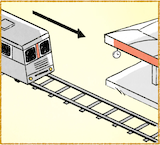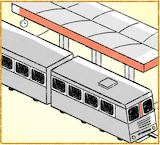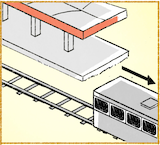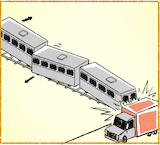




นี้คืออี่หยัง นี้คือลดไฟ
ลดไฟกำลังแล่น ลดไฟกำลังแล่นไปข้างหน้า
มันแล่นอยู่เทิงลาง ลางของมันเป็นเหล็ก ลางของมันเฮ็ดจากเหล็ก ลดไฟกะเฮ็ดจากเหล็กคือกัน
ลดไฟขะบวนหนึ่งสิมีหลายซ้อง หลือหลายหม้องนั่ง ที่สามาดเฮ็ดให้คนนั่งได้หลายคน
17
ลดไฟกำลังเฮ็ดหญัง ลดไฟกำลังสิฮอดป้ายของมัน กำลังสิฮอดสะถานีลดไฟ มันกะกำลังสิจอด ขั้นมันฮอดแล้ว มันกะสิจอด
อยู่หม้องป้ายลดไฟ สิมีนาลิกาพ้อม เอาไว้ถ้าเบิ่งเวลา ว่าลดไฟคันนี้ สิมาฮอดป้ายจักโมงๆ
18
ลดไฟกำลังเฮ็ดหญัง ลดไฟกำลังจอดอยู่ป้าย กำลังจอดอยู่สะถานีลดไฟ ตอนนี้ลดไฟจอดอยู่
เป็นหญังลดไฟคือจอด จอดเพื่อที่สิได้ฮับ หลือส่งพุโดยสานขึ้นลงลดไฟ ขั้นพุใดสิไปข้างหน้ากะสิขึ้นลดไฟ ขั้นพุใดฮอดหม้องลงแล้วกะสิลงจากลดไฟนั้น
ขั้นพุโดยสานลงลดไฟเบิดแล้ว หลือพุโดยสานขึ้นลดไฟเบิดแล้ว ลดไฟกะสิออกจากป้ายนั้น หลือออกจากซานซาลานั้น
19
ลดไฟกำลังเฮ็ดหญัง ลดไฟกำลังออกจากป้ายลดไฟ ตอนนี้ลดไฟออกจากป้ายแล้ว
แล้วลดไฟสิไปใส ลดไฟกะสิไปข้างหน้า กะสิขี่ไปเลี้ยยๆ ไปป้ายข้างหน้า เพื่อที่สิไปจุดหมายหน้า
20
ลดไฟมันเกิดอี่หยังขึ้น ลดไฟมันขี่มาตำลดบันทุก หลือลดขนของ
มันตำกันแฮงบ่ ตำกันแฮงอยู่ คือสิตำแฮงบักคักหนึ่ง จนลดไฟตกออกจากลางเอาโลด
ขั้นลดไฟตำลดบันทุกแล้ว มันสิเสียหายหลายบ่ เสียหายหลายอยู่ เทิงลดบันทุกและลดไฟอาดสิมีความเสียหายหลาย แล้วทางในลดกะอาดสิมีพุคนบาดเจ็บ หลือคนเจ็บหนักกะได้
ลดไฟตกลางเลยแม่นบ่ แม่น ลดไฟขะบวนนี้ ตำลดบันทุก แล้วเฮ็ดให้ลดไฟตกลางเลย เบิ่งแล้วมันตาย้านหลาย ตาย้านบักคักหนึ่ง
Link to overview page
Link to dictionary
| Isaan | Pronunciation | Tones | Thai | English/Notes |
|---|---|---|---|---|
| นี้ | ni: | HF | นี้ | 1. this 2. here |
| คือ | khʉ: | HR | คือ | 1. to be, to resemble, like, as 2. why {บักหล้าคือบ่เก็บโต่ะแน่ = [addressing a young boy] Why haven't you cleared the table?} |
| อี่หยัง | i:-yaŋ | H-M | อะไร | 1. what {นี้คืออี่หยัง = What is this?} {มื้อนี้เจ้าเฮ็ดอี่หยัง = What are you doing today?} {กินเข้างายกับอี่หยัง = What did you have for breakfast?} 2. something, anything, (in negations) nothing {บ่ต้องเฮ็ดอี่หยังอีกเลยนอกจากใส่ปุย = [we] don't need to do anything besides adding fertilizer} |
| ลดไฟ | lot-fai | H-HR | รถไฟ | train |
| กำลัง | gam-laŋ | M-HR | กำลัง | auxiliary indicating continuous or progressive action |
| แล่น | lɛ:n | H | วิ่ง | to run {ไก่กำลังแล่น = the chicken is running} {เด็กน้อยกะแล่นเหล้น = the kids are running around} {ลดไฟกำลังแล่น มันแล่นอยู่เทิงลาง = the train is running, it's running on rails} {เลียแล่นไปแล่นมา = ships are going back and forth} |
| ไป | pai | M | ไป | 1. to go 2. auxiliary indicating action extending into the future |
| ข้างหน้า | kha:ŋ-na: | LF-LF | ข้างหน้า | in front, forward |
| มัน | man | HR | มัน | it (also used to refer to people) |
| อยู่ | yu: | H | อยู่ | 1. to be (located) at 2. yet, still 3. auxiliary indicating continuous or progressive action {ทอดปาอยู่ในกะทะ = (in the process of) frying a fish in the pan} {แม่กำลังเมี้ยนเฮียนอยู่ = mother is cleaning/tidying up the house} |
| เทิง | thə:ŋ | HR | บน | 1. on, on top of, at, in {เทิงโต่ะ = at/on the table} {กบมันนั่งอยู่เทิงใบบัว = the frog is sitting on the lotus leaf} {เทิงท้องฟ้า = in the sky} {มันแล่นอยู่เทิงลาง = [the train] runs on rails} {มีคนนั่งอยู่เทิงลดสามล้อสามคน = there are three people sitting in the tuk tuk} 2. up, upward Notes: pronunciation: also realized as ทัง |
| ลาง | la:ŋ | HR | ราง | rail |
| ของ | khɔ:ŋ | M | ของ | of, belonging to |
| เป็น | pen | M | เป็น | 1. to be, to exist 2. to be able to 3. to suffer, sth. happens to 4. เป็นหญัง[...]คือ in initial position: why? {เป็นหญังเขากะคือแปงฟัน = Why is he brushing his teeth?} {เป็นหญังเคี่ยงบินมันคือสิตก = Why is the airplane falling down?} |
| เหล็ก | lek | M | เหล็ก | iron, steel, metal |
| เฮ็ด | het | H | ทำ | to do, to make |
| จาก | ja:k | LF | จาก | 1. from {... เฮ็ดมาจากอี่หยัง = ... is made from what?} 2. to depart |
| กะ | ga | M | ก็ | 1. then, consequently 2. also |
| คือกัน | khʉ:-gan | HR-M | เหมือนกัน | 1. also, likewise, similarly {ยินดีที่ได้ฮู้จักคือกันคับ = Nice to meet you too!} 2. in negative sentences: either {บ่ลู้คือกัน = I don't know either} {จักคือกัน = I don't know (either)} |
| ขะบวน | kha-bu:an | M-M | ขบวน | clf. for trains |
| หนึ่ง | nʉŋ | H | หนึ่ง | 1. one 2. after adjective: intensifier {บักคักหนึ่ง = very much} {อันบักใหญ่หนึ่ง = very large}, or attenuates the meaning {กะดาดมันแผ่นน้อยๆ หนึ่ง = the piece of paper is [relatively] small} |
| สิ | si | M | จะ | future tense auxiliary {เขากำลังสิตื่น = he's about to wake up} {สิไปตะหลาด = [I'm] going to the market} |
| มี | mi: | HR | มี | 1. to have 2. there is |
| หลาย | la:i | M | เยอะ, มาก | many, much, very |
| ซ้อง | sɔ:ŋ | HF | ช่อง | 1. opening, slot 2. train cabin 3. TV channel 4. clf. for window panes |
| หลือ | lʉ: | M | หรือ | or |
| หม้อง | mɔŋ | LF | ที่, แห่ง, บริเวณ | 1. place, area {หลายที่หลายหม้อง = in many places} {หม้องใดหม้องหนึ่ง = some place} 2. clf. for places |
| นั่ง | naŋ | H | นั่ง | to sit |
| ที่ | thi: | H | ที่ | 1. that, which {คนที่ยืนอยู่ฝั่งขวา = the person which is standing on the right = the person standing on the right} {เว้าคำที่บ่สุพาบ = to speak words which are impolite = to speak impolitely} 2. for ordinal numbers {ที่สาม = third} |
| สามาด | sa:-ma:t | M-HF | สามารถ | can, to be able |
| ให้ | hai | LF | ให้ | 1. to give {หมอกำลังเอายาให้คนป่วยกิน = the doctor is giving the patient medicine} 2. for 3. to allow, to be allowed |
| คน | khon | HR | คน | person, people |
| ได้ | dai | HF | ได้ | 1. can 2. to get, to obtain 3. before verb: indicating past tense 4. บ่ได้ + verb: not |
| หญัง | ɲaŋ | M | อะไร, เป็นหญัง = ทำไม | 1. what {เขากำลังเฮ็ดหญัง = What is he doing?} {ธูปเอาไว้เฮ็ดหญัง = What are incense sticks for?} 2. something, anything, (nothing) 3. เป็นหญัง[...]คือ in initial position: why {เป็นหญังเขาคือใส่บักพิกลงไปในกวยเตียว = Why is he putting chili in [his] noodle soup?} {เป็นหญังหน้าต่างมันคือเปิด = Why is the window open?} {เป็นหญังมันคือมีควนไฟ = Why is there smoke?} |
| ฮอด | hɔ:t | HF | ถึง | 1. to arrive, to attain {ฮอดจุดหมายปายทาง = (airplane, train etc.) to arrive at one's destination} {มันทันได้ฮอดหกโมงอยู่ = it's not yet 6 o'clock} 2. to, at {ผมญาวฮอดบ่าไหล่เอาโลด = long hair down to the shoulders} 3. about {บ่ได้เว้าฮอด = [I] haven't talked about [this]} {คนที่เฮาเว้าฮอดวั่งหั้นหละ = the person we've just talked about} |
| ป้าย | pa:i | HF | ป้าย | 1. train/bus stop 2. sign, signboard |
| สะถานี | sa-tha:-ni: | M-M-HR | สถานี | station |
| จอด | jɔ:t | LF | จอด | to park, to stop |
| ขั้น | khan | LF | เมื่อ | when, if |
| แล้ว | lɛ:o | HF | แล้ว | 1. finished 2. already 3. and then, and next (especially แล้วกะ) 4. auxiliary for past tense |
| นาลิกา | na:-li-ga: | HR-H-M | นาฬิกา | 1. clock, watch 2. o'clock {สิบสองนาลิกา = 12 o'clock} |
| พ้อม | phɔ:m | HF | พร้อม | at the same time, also, too {มีตะเว็นพ้อม = the sun's out, too} {กะทะมีด้ามพ้อม = the pan has also a handle} |
| เอา | ao | M | เอา | to take, to give {เขากำลังเอาก่องไปซั่ง = he's taking the boxes to weigh them} {หมอกำลังเอายาให้คนป่วยกิน = the doctor is giving medicine to the patient} {เอาไว้ถ้า = is for, is used for, has the purpose of} |
| ไว้ถ้า | wai-tha: | HF-LF | usually in a positive statement or answer: is for, is used for, has the purpose of {กะทะมีไว้ถ้าทอด = a pan is for frying} {น้ำบักนาวมีไว้ถ้าปุงอาหาน = lime juice is used to season food} {ปากกามีไว้ถ้าเขียน = a pen is for writing} {กะเทียมเอาไว้ถ้าเฮ็ดแนวกิน = garlic is used to make food} {ขาเอาไว้ถ้าญ่าง = legs are for walking} {เกิบเอาไว้ถ้าใส่ = shoes are for wearing} Notes: see also ไว้ |
|
| เบิ่ง | bəŋ | H | ดู | 1. to look at, to see, to watch {เบิ่งโทละทัด = to watch TV} {เบิ่งหนัง = to watch a movie} 2. to guess {เบิ่งซงแล้ว ... = [I] guess / from what it looks like ...} |
| เวลา | we:-la: | HR-HR | เวลา | time, period |
| ว่า | wa: | H | ว่า | 1. that, as {คำว่า X = the word X} 2. to say |
| คัน | khan | HR | คัน | clf. for cars, trains, motorbikes, boats {ลดไฟคันนี้ = this train} {ลดเก็งคันสีเขียวคันน้อย = a small green car} |
| มา | ma: | HR | มา | 1. to come 2. auxiliary expressing action towards the present or focal time {กะคุเฮ็ดมาจากอี่หยัง = What is the bucket made of?} {แล้วเขากะเก็บเงินจากพุนั้นมา = and then she takes the money of that person} |
| จัก | jak | M | จัก | 1. answer to a question: [I] don't know, don't know exactly, [I'm] not sure {พุซายคนนี้เขาเถ้าไป่ จัก จักเถ้าหลือบ่เถ้า เบิ่งบ่ค่อยออก = Is this man here already old? I don't know. I can't see clearly whether he's old or not.} {เขาเว้ากันอยู่ใส จักคือกัน = Where are they talking? I don't know either.} 2. exact(ly), what exactly {จักต้มอี่หยังกะบ่ฮู้ = I don't know what (exactly) he is cooking} {บ่ลู้คือกันจักปาอี่หยัง = I don't know either what kind of fish this is} 3. how much/many? {ต้นไม้มีจักต้น = How many trees are there?} {ตอนนี้จักโมงแล้ว = What time is it now?} {มือของเฮานี้สิมีจักนิ้ว = How many fingers do our hands have?} 4. a bit, a little bit {จักหน่อย/จักหน่อยหนึ่ง = a bit, a little bit} |
| โมง | mo:ŋ | HR | โมง | o'clock, hour {ตอนนี้เวลาจักโมงแล้ว = What time is it?} {ตอนนี้เวลาห้าโมงเคิ่ง = It's half past five.} |
| ตอนนี้ | tɔ:n-ni: | M-HF | ตอนนี้ | now |
| เพื่อที่ | phʉ:a-thi: | H-H | เพื่อที่ | in order to, so that Notes: the vowel เอือ is likely to be a Thai loan |
| ได้ฮับ | dai-hap | HF-H | ได้รับ | to receive, to take |
| ส่ง | soŋ | H | ส่ง | 1. to send 2. to give, to hand sth. (over), to pass 3. to bring so., e.g., to their destination {ลดปะจำทางคันนี้สิแล่นไปส่งพุโดยสาน = the bus brings the passengers to their destinations} 4. to emit (e.g., a smell, noise) {ส่งเสียง = to make a noise} |
| พุโดยสาน | phu-do:i-sa:n | H-M-M | ผู้โดยสาร | passenger |
| ขึ้น | khʉn | LF | ขึ้น | 1. to go up, to increase 2. sun: to rise {ตะเว็นกำลังขึ้น = the sun is rising} 3. more 4. bus/train etc.: to get on, to board {พุโดยสานขึ้นลดไฟเบิดแล้ว = all passengers have boarded the train} |
| ลง | loŋ | HR | ลง | 1. to descend, to lower, to go down 2. down 3. bus/train etc.: to get off, to disembark {คนกำลังลงลดบั่ด = people are getting off the bus} 4. boat/ship etc.: to get on, to board {เขากำลังญ่างลงเลีย = he's boarding/getting on the boat} |
| พุใด | phu-dai | H-M | ใคร | 1. who {มีพุใดโทมากะบ่ลู้ = I don't know who has called} {ห้องนอนของพุใด = whose bedroom (is this)? } 2. someone, somebody, anybody, in negative context: nobody {บ่มีพุใดอยู่กับเขาเลย = there's nobody with him} |
| นั้น | nan | HF | นั้น | that, there |
| เบิด | bə:t/bət | LF/M | หมด | 1. completely, totally, entirely {เทิงเบิด = all of them} {เบิดมื้อเบิดค่ำ = [all] day and night} {ขั้นพุโดยสานลงลดไฟเบิดแล้ว [...] = when all passengers have disembarked […]} {เขากินเบิดบ่ = Has he eaten all of it?} 2. to be finished, to be exhausted, to come to an end, to have no more {โน่ดบุ่กแบ็ดเบิด = the notebook is out of battery/the notebook needs recharging} |
| ออก | ɔ:k | LF | ออก | 1. to go out, to leave 2. out |
| ซานซาลา | sa:n-sa:-la: | HR-HR-HR | ชานชาลา | train/bus station: platform |
| ใส | sai | M | (ที่)ไหน | 1. where? {สิไปใส = Where are [you] going?} {มาแต่ใส = Where are [you] coming from?} {กะทะอยู่ใส = Where's the pan?} 2. somewhere, anywhere {ใสกะได้ = anywhere, wherever you like} |
| ขี่ | khi: | H | ขี่ | to ride, to drive {ขี่มอเตอไซ = to ride a motorbike} {ขี่ควย = to ride on a buffalo} {ขี่เลีย = to take or travel on a boat} |
| เลี้ยยๆ | li:ai | HF | เรื่อยๆ | continuously Notes: pronunciation: also realized as เลื้อยๆ |
| จุดหมาย | jut-ma:i | M-M | จุดหมาย | destination, goal, aim, objective |
| หน้า | na: | LF | หน้า | 1. front {ปะตูหน้า = front door} 2. face {เขากำลังล้างหน้า = he's washing his face} 3. auxiliary: conditional tense {เขาหน้าสิเป็นพุบ่าวพุสาวกัน = they are probably groom and bride} {กะหน้าสิส้มอยู่ = it's likely to be sour} 4. season {หน้าฮ้อน = hot season} 5. page 6. clf. for pages {เฮาอ่านฮอดหน้านั้นแล้ว = we've read until this page} |
| เกิด | gə:t | LF | เกิด | 1. (often together with ขึ้น) to happen, to arise, to take place {เกิดอี่หยังขึ้น = what is happening?} {บ่มีหญังเกิดขึ้น = nothing's happening} 2. to be born 3. to grow {หนวดกะคือสิเกิดอยู่ใต้ดัง = a moustache grows below the nose} |
| ตำ | tam | M | ตำ | 1. to hit 2. to bump into 3. chili, garlic etc.: to pound |
| ลดบันทุก | lot-ban-thuk | H-M-H | รถบรรทุก | truck, transport vehicle |
| ลดขนของ | lot-khon-khɔ:ŋ | H-M-M | รถขนของ | truck, transport vehicle |
| กัน | gan | M | กัน | mutual, each other, with another, together {เขากำลังนั่งเว้ากัน = they're sitting and talking} {เขาสองคนฮักกัน = they love each other} {ปาสองโตนี้ ใหญ่ห่างกันหลายบ่ = These two fish here, are they very different in size (from each other)?} {ต่างกัน = to be different (from each other)} {ก่องอันไหนหนักกว่ากัน = Which box is heavier (than the other(s))?} |
| แฮง | hɛ:ŋ | HR | แรง | 1. strong {ลมกำลังพัดแฮงอยู่ = to wind is blowing strongly} 2. loud {เสียงแฮง = loud} 3. strength, power |
| บ่ | bɔ: | H | ไม่ | 1. no, not 2. question particle, transforming a statement into a question Notes: spelling exception in line with common usage on social media |
| บักคักหนึ่ง | bak-khak-nʉŋ | M-H-H | intensifier: very, very much (variant of คัก) | |
| จน | jon | M | จน | 1. poor {คนจน = a poor person} 2. until, such that {เสียงดังเลี้ยยๆ จนคนสิลับ = (phone) it's ringing until [he/someone] answers the call} {ถ้าจน [...] = to wait until [...]} |
| ตก | tok | M | ตก | 1. to fall, to drop 2. sun: to set {ตะเว็นตกดิน = the sun is setting} |
| เอาโลด | ao-lo:t | M-HF | เอาเลย, ทำเลย, จริงๆ | in final position: intensifier {โตส่ำกะทะเอาโลด = [a fish] as large as the pan!} {เกียบเต็มถ้วยเอาโลด = the bowl is almost full!} {ทะนาคานมันสิไปตั้งไว้อยู่ซู่หม้องเอาโลด = banks are everywhere!} |
| เสียหาย | si:a-ha:i | M-M | เสียหาย | to damage |
| เทิง | thə:ŋ | HR | ทั้ง | 1. up to, all, all of, the whole of, altogether {เขาใส่กางเกงขาสั้นเทิงสองคน = both are wearing short trousers} {เขาเป็นพ่อของลูกเทิงสามคนนี้ = he's the father of these three [children] here} 2. เทิง ... เทิง ...: both ... and ..., ... as well as ... {เทิงมีใบพ้อม เทิงมีเหลียนพ้อม = there are notes as well as coins} Notes: pronunciation: also realized as ทัง |
| และ | lɛ | H | และ | and |
| อาด | a:t | LF | อาจ | 1. might, may, will 2. likely |
| ความ | khwa:m | HR | ความ | 1. prefix: state, condition, quality 2. content, subject, matter, affair |
| ทาง | tha:ŋ | HR | ทาง | 1. way, direction {พุหญิงกะสิไปทางหนึ่ง พุซายกะสิไปอีกทางหนึ่ง = the woman goes one way, the man another way} {ตะเว็นไปทางใด = Where has the sun gone?} {เขาถีบจักกะย๊านไปทางหน้า = he's biking on/onward/forward} {มาเว้า มาว่าเฮาในทางที่บ่ดี = he's scolding [me], he's talking to me improperly} 2. by, through, via etc. {เว้าทางโทละสับ = to talk on the phone} |
| ใน | nai | HR | ใน | in, within |
| ลด | lot | H | รถ | 1. car, motorized vehicle 2. vehicle, cart {ลดขายแนวกิน = food cart} |
| พุ | phu | H | ผู้ | 1. person 2. clf. for people {พุหญิงพุหนึ่ง พุซายพุหนึ่ง = a woman, a man} {ซู่พุซู่คน = everybody} {พุหนึ่งโตจ่อยๆ พุหนึ่งโตบักอ้วนหนึ่ง = one person is slim, the other is fat} Notes: pronunciation: also realized as พู่- |
| บาด | ba:t | LF | บาด | to injure, to wound, to cut |
| เจ็บ | jep | M | เจ็บ | painful, to hurt |
| หนัก | nak | M | หนัก | heavy |
| เลย | lə:i | HR | เลย | 1. futher on, beyond, past {เข็มน้อยเลยเลขสิบสองไป = the minute hand has passed number twelve} 2. too much 3. at all 4. definitively 5. completely, utterly |
| แม่นบ่ | mɛ:n-bɔ: | H-H | ใช่ไหม | question particle: ..., right? ..., isn't it? ..., don't you? etc. {เจ้าได้เห็นสิ่งนั้นแม่นบ่ = You've seen that, haven't you?} {ฝนกำลังตกแม่นบ่ = It's raining, isn't it?} {นี้คือกะคุแม่นบ่ = This is a bucket, isn't it?} |
| แม่น | mɛ:n | H | ใช่ | 1. yes 2. affirmative particle |
| ตาย้าน | ta:-ya:n | M-HF | น่ากลัว | scary, not safe |